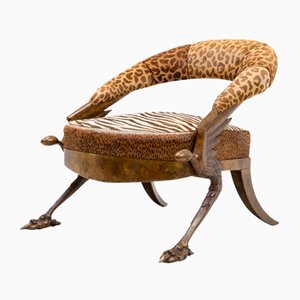
Artist, sculptor, furniture maker, lighting designer, and engineer, Mark Brazier-Jones was born in New Zealand in 1956 and moved to the UK at the age of 12. After earning a BA in ceramic sculpture, he found work in the emerging music video business. In the late 1970s and early ’80s, he designed and built sets for the likes of David Bowie, Duran Duran, Spandau Ballet, Freddy Mercury, and Elton John.
As he became enmeshed in the legendary London warehouse party scene, he developed a close friendship with both Tom Dixon and Nick Jones, members of local band Funkapolitan. Brazier-Jones would wow the band's audiences with "performance art welding," in which he would cut up cars with angle grinders and create phoenix-shaped mascots out of supermarket trolleys. The three friends started the Creative Salvage Group in 1983, later to be joined by André Dubreuil. Their first show of welded sculpture-furniture sold out and opened a new chapter in design history.
After a few years, Brazier-Jones moved to the countryside and returned to his ceramic roots. Soon he was sculpting furniture to be cast in bronze. He conceived his first limited-edition chair, the Wingback, in 1987; it was sold out before the start of 1988. Other standouts from Brazier-Jones’ career include the Bond Armchair (ca. 1990), San Demas Lounge (1996), and Duchess Chandelier (2010).
Brazier-Jones’s work can be found in museum’s around the world, like the Victoria & Albert in London, Museum of Art & Design in New York, and Musée des Arts Décoratifs in Paris, as well as many important private collections. Today, Brazier-Jones’s studio can be found in a 16th-century barn in Hertfordshire, where he continues to work on private commissions, crafting most of his limited-edition and one-off designs by hand.

